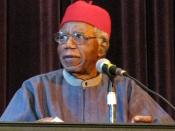Conrad: Kill Whitey
Indigenous peoples of Africa die every day because of war, famine, and disease largely due to the legacy of European imperialism. Joseph Conrad, who saw firsthand "the horror" (Conrad 154) of imperialism as a ship captain, sought to change public opinion and call attention to the atrocities committed. In Heart of Darkness, Conrad articulates his negative view of imperialism as oppressive and hypocritical through contrasts and parallels of Africa and Europe
Conrad's sympathetic portrayal of natives and demonizing portrayal of the Europeans makes the reader actively despise the institution of imperialism by forcing them to condemn the actions of Europeans in every circumstance presented. In his journey to the inner station, Marlow captains a ship that is crewed by cannibals and carries Pilgrims. Conrad sets up a decisive contrast as Marlow observes with puzzlement that the cannibals act restrained, even though the Pilgrims throw out their food.
Marlow, acting as the European perspective "saw that something restraining, one of those human secret that baffle probability, had come into play here," (Conrad 116). While this situation of native cannibals versus European pilgrims illustrates a distinct difference in behavior, other incidents stand out as well; most of Marlow's encounters portray the natives not as villains, but as victims. At the central station he watches as a black man is beaten by whites for "[they] said he had caused the fire in some way; be that as it may, he was screeching most horribly," (Conrad 92). Here, Marlow characteristically infused doubt as to the man's guilt, through the "be that as it may" clause, that further shows victimization. But how much of this behavior is fiction? Avrom Fleishman writes that in his other works, Conrad consistently demonstrates how Europeans in their contact with natives show an emergence of "submerged barbarism"...



Nice...
Very well-written essay. You draw good conclusions based on your arguments.
2 out of 2 people found this comment useful.